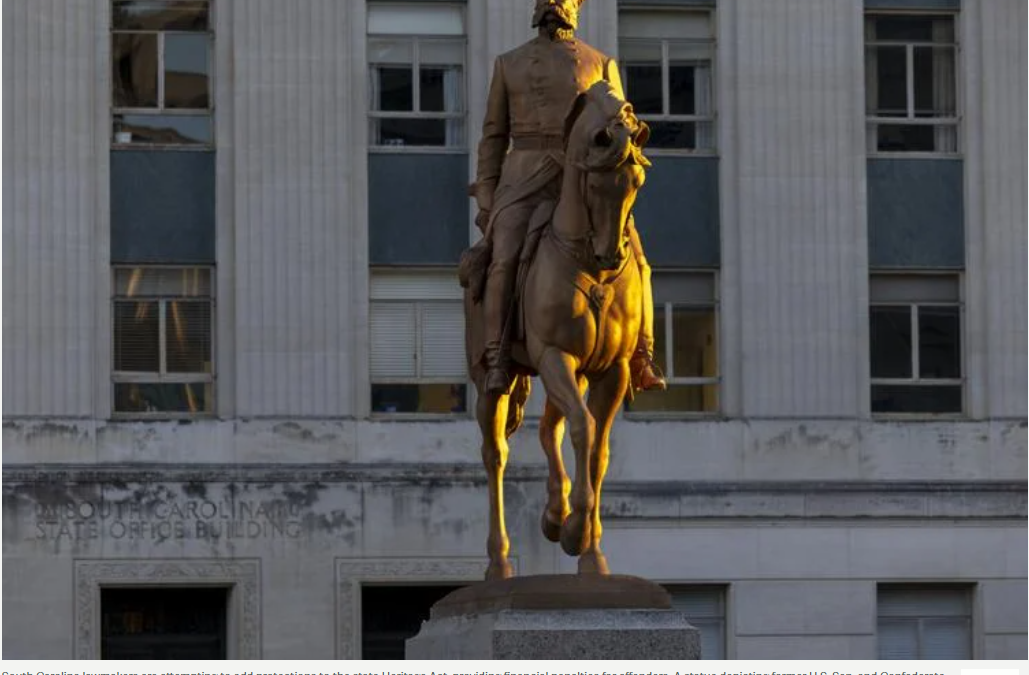SOUTH CAROLINA: SC lawmakers taking steps to further protect Confederate monuments with penalties and context controls
COLUMBIA — South Carolina lawmakers want to strengthen the state’s Heritage Act, which establishes protections for Confederate and other monuments by prohibiting local officials from adding plaques that put controversial statues in modern context.
The legislation proposed March 26 also requires the state treasurer to withhold funds from any local government which violates the law. It additionally expands the Statehouse’s power to control private monuments on public grounds.
The private monument aspect of the bill could have covered the John C. Calhoun monument that previously stood in Charleston’s Marion Square, which the City Council removed in 2020.
Supporters could not immediately say if the bill, should it be passed, could be enforced retroactively.
Calling the old version of the act “ineffective” as it stands today, supporters introduced legislation in both the House and Senate they say is a stronger, more specific law to ensure “heritage” and “memory” in the state are not erased. While encompassing the state, the legislation has a particular eye toward Charleston as multiple groups have moved to take down Confederate statues or rename buildings.
Lawmakers were quick to call them out.
“There’s been a war in recent years waged against all these monuments,” Rep. Bill Taylor, R-Aiken, sponsor of the House bill, said at a press conference.
“The heritage roots run really deep in South Carolina, so it’s up to each of us to stand up and to protect the treasured history from the small minority of the offended in America who want to take stuff down,” he added.
The bills by Sen. Danny Verdin, R-Laurens, and Taylor would expand state protections to all historical monuments on public property, not just certain war-related ones. The S.C. Heritage Act protects a vast array of memorials, from African American monuments to Revolutionary War statutes. The legislature has sole authority over any changes to them.
Taylor and supporters of the legislation called out both Charleston City Council and the Charleston County School District during the press conference for their “blatant disregard of history.”
“We saw firsthand in Charleston how elected officials there seized the opportunity to topple the Calhoun monument and continue to work to strip away the other historical plaques, statues and monuments,” Taylor said. “And in my view, they’re also anarchists for this.”

The John C. Calhoun statue is lowered from the pedestal in Charleston’s Marion Square on June 22.
Charleston City Council removed a monument of Calhoun, a Southern politician and fierce supporter of slavery, in 2020 from its 125-foot stone pillar in Marion Square on the peninsula. The 12-foot-tall figure that stood for over 100 years is still at the heart of multiple legal disputes from groups hoping to reinstate it.
It was ruled exempt from the existing Heritage Act, in part, because Calhoun, a strong advocate of slavery, died a decade before the Civil War. Also because the caretakers of Marion Square, the Washington Light Infantry Sumter Guards, said it had no ownership interest in the Calhoun statue.
In 2021, the school district removed a highway stone honoring Confederate Gen. Robert E. Lee Memorial Highway at the Charleston Charter School for Math and Science. The battle caught the eye of Attorney General Alan Wilson, who filed an amicus brief asking a judge to force the school district to reinstall the monument.
Supporters of the bill were unsure at the press conference if it would have retroactive penalties for groups which already took down memorials or monuments, or if it would require their reinstatement.
“I’m not an attorney, so I can’t comment,” Brett Barry, board member of the American Heritage Association, told reporters. “I don’t believe it would, but I don’t know.”
Currently, the Heritage Act states monuments cannot be altered with contextualization. The proposed legislation in the House and Senate goes further to include plaques. This is in reference to some groups wanting to add historical context to statues, like Calhoun and his view on slavery.
The idea for the legislation was discussed at an annual Statehouse Sons of Confederate Veterans meeting where Verdin spoke and House Speaker Murrell Smith, R-Sumter, said “cancel culture is here,” and added that opponents needed to “adhere to our integrity, to the way we were raised.”
Verdin said over half the Senate has co-sponsored the bill he filed, and Taylor said he has garnered support from more than 20 House lawmakers.
“There was nothing sad about our grandfathers, our great-grandfathers, our grandmothers, our great-grandmothers … that came before us sacrificially in many cases,” Verdin said.
State Rep. Wendell Gilliard, D-Charleston, said the state has greater issues, like health care and homelessness than in revisiting monument protections.
The goal in the Statehouse is to “unite, boast solidarity,” he said, and keep moving forward. Bills like the expansion of the Heritage Act are “dangerous,” especially the fact that it calls for a punishment, he said.
“We’re trying to correct the past, we’re not trying to relive it or go back to it,” Gilliard said. “What are you going to ask for next, for the Confederate flag to be put back on the state Capitol?”
–postandcourier.com



